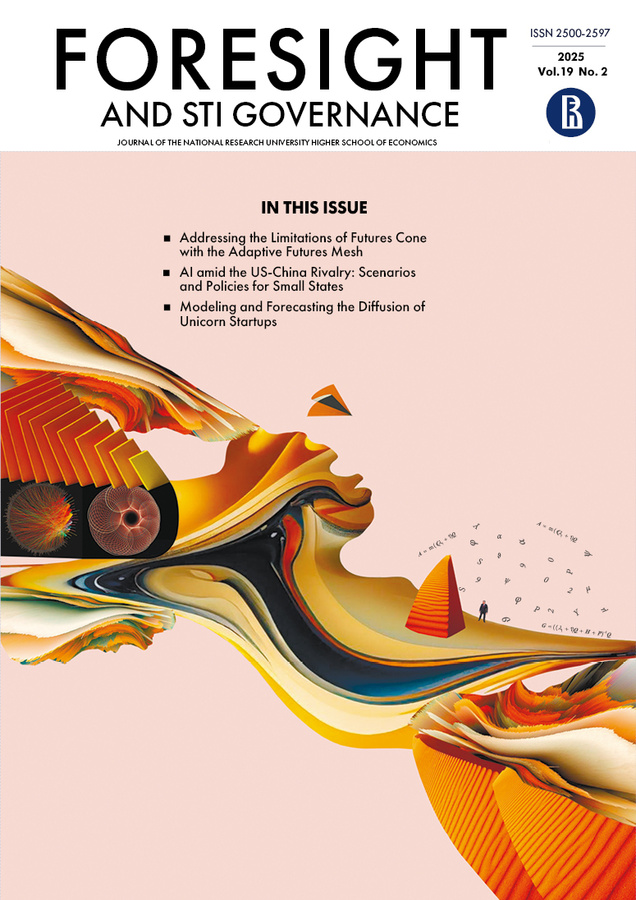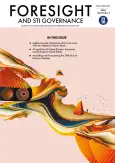Exploring Relationship Dynamics in Entrepreneurial Ecosystems and Their Impact on Innovation
- Authors: Vicentin D.C1, Moraes G.2, Bianca do Prado N.3, Fischer B.B2, Carneiro Campello B.S3, Anholon R.3
-
Affiliations:
- State University of Campinas (UNICAMP)
- Университет Кампинаса
- University of Campinas (UNICAMP)
- Issue: Vol 19, No 2 (2025)
- Pages: 43-53
- Section: INNOVATION
- URL: https://bakhtiniada.ru/1995-459X/article/view/307344
- DOI: https://doi.org/10.17323/fstig.2025.25819
- ID: 307344
Cite item
Abstract
This study investigates how key entrepreneurial ecosystem (EE) factors interact and are reconfigured in response to economic turbulence. Using Russia as a case study, we analyze the systemic dynamics of EE through the lens of the Complex Adaptive Systems (CAS) theory, identifying the most influential factors driving ecosystem resilience. A quantitative approach was employed using the fuzzy Decision-Making Trial and Evaluation Laboratory (DEMATEL) method. Data were collected from highly experienced experts, including academics and market professionals with extensive knowledge of urban EEs in Russia. Their evaluations provided a robust understanding of causal relationships and the adaptability of EE factors under economic instability. The regulatory environment emerged as the primary driver of EE reconfiguration, significantly influencing other factors. Human capital and access to capital were also critical for sustaining entrepreneurship in turbulent contexts, whereas innovation was highly dependent on external conditions rather than acting as an independent driver. These findings highlight the need for adaptive policies to enhance EE resilience, offering a novel methodological framework for understanding EE adaptability in emerging economies.
About the authors
D. C Vicentin
State University of Campinas (UNICAMP)
Author for correspondence.
Email: damarisv@unicamp.br
G. Moraes
Университет Кампинаса
Email: salati@unicamp.br
N. Bianca do Prado
University of Campinas (UNICAMP)
Email: nagelabianca.prado@gmail.com
B. B Fischer
Университет Кампинаса
Email: bfischer@unicamp.br
B. S Carneiro Campello
University of Campinas (UNICAMP)
Email: betaniac@unicamp.br
R. Anholon
University of Campinas (UNICAMP)
Email: rosley@unicamp.br
References
- Aeeni Z., Saeedikiya M. (2019) Complexity Theory in the Advancement of Entrepreneurship Ecosystem Research: Future Research Directions. In: Eurasian Business Perspectives (eds. В.M.H. Bilgin, H. Danis, E. Demir, U. Can), Heidelberg, Dordrecht, London, New York: Springer International Publishing, pp. 19–37.
- Altshuller M. (2017) Another Forgotten War: The Lack of a Western Response to the Ukrainian Conflict. Harvard International Review, 38(S1), 7–8. http://www.jstor.org/stable/26445588
- Ansell C., Jarle T., Ogard M. (2017) Governance in Turbulent Times, Oxford: Oxford University Press. https://doi.org/10.1093/acprof:oso/9780198739517.001.0001
- Arici T., Gok M. (2024) Ambiguous Effect of Environmental Turbulence on Innovation and Performance: Analyzing Technology Sectors. Journal of Innovations in Business and Industry, 2(1), 13–23. https://doi.org/10.61552/jibi.2024.01.003
- Audretsch D.B., Belitski M. (2017) Entrepreneurial ecosystems in cities: Establishing the framework conditions. The Journal of Technology Transfer, 42(5), 1030–1051. https://doi.org/10.1007/s10961-016-9473-8
- Audretsch D.B., Cunningham J.A., Kuratko D.F., Lehmann E.E., Menter M. (2019) Entrepreneurial ecosystems: Economic, technological, and societal impacts. The Journal of Technology Transfer, 44(2), 313–325. https://doi.org/10.1007/s10961-018-9690-4
- Bone C. (2016) A complex adaptive systems perspective of forest policy in China. Technological Forecasting and Social Change, 112, 138–144. https://doi.org/https://doi.org/10.1016/j.techfore.2016.08.024
- Brondoni S.M. (2022) Russian-Ukrainian War, Innovation, Creative Imitation & Sustainable Development. Symphonya. Emerging Issues in Management, 1, 4–9. https://doi.org/10.4468/2022.1.02brondoni
- Brown R., Mason C. (2017) Looking inside the spiky bits: a critical review and conceptualisation of entrepreneurial ecosystems. Small Business Economics, 49(1), 11–30. https://doi.org/10.1007/s11187-017-9865-7
- Cantner U., Cunningham J.A., Lehmann E.E., Menter M. (2021) Entrepreneurial ecosystems: A dynamic lifecycle model. Small Business Economics, 57(1), 407–423. https://doi.org/10.1007/s11187-020-00316-0
- Carter W., Pezeshkan A. (2023) The complexity of entrepreneurial ecosystem evolution and new venture policy: The case of the U.S. commercial space ecosystem. Technological Forecasting and Social Change, 192, 122568. https://doi.org/https://doi.org/10.1016/j.techfore.2023.122568
- Cloutier L., Messeghem K. (2022) Whirlwind model of entrepreneurial ecosystem path dependence. Small Business Economics, 59(2), 611–625. https://doi.org/10.1007/s11187-021-00553-x
- Colovic A., Schruoffeneger M. (2022) Entrepreneuring for deprived urban communities: Exploring the role of micro-entrepreneurship. European Management Review, 19(3), 450–461. https://doi.org/https://doi.org/10.1111/emre.12458
- Daniel L.J., de Villiers Scheepers M.J., Miles M.P., de Klerk S. (2022) Understanding entrepreneurial ecosystems using complex adaptive systems theory: getting the big picture for economic development, practice, and policy. Entrepreneurship & Regional Development, 34(9–10), 911–934. https://doi.org/10.1080/08985626.2022.2083691
- Fredin S., Lidén A. (2020) Entrepreneurial ecosystems: Towards a systemic approach to entrepreneurship? Geografisk Tidsskrift – Danish Journal of Geography, 120(2), 87–97. https://doi.org/10.1080/00167223.2020.1769491
- Fuentelsaz L., Maicas J.P., Montero J. (2023) The social status of entrepreneurs: An analysis of informal and formal institutional determinants. European Management Review, 12616 (ahead-of-print). https://doi.org/10.1111/emre.12616
- Han J., Ruan Y., Wang Y., Zhou H. (2021) Toward a complex adaptive system: The case of the Zhongguancun entrepreneurship ecosystem. Journal of Business Research, 128, 537–550. https://doi.org/https://doi.org/10.1016/j.jbusres.2019.11.077
- Isenberg D. (2010) How to start an entrepreneurial revolution. Harvard Business Review, 88, 40–51.
- Khurana I., Dutta D.K., Singh Ghura A. (2022) SMEs and digital transformation during a crisis: The emergence of resilience as a second-order dynamic capability in an entrepreneurial ecosystem. Journal of Business Research, 150, 623–641. https://doi.org/https://doi.org/10.1016/j.jbusres.2022.06.048
- Kuratko D.F., Fisher G., Bloodgood J.M., Hornsby J.S. (2017) The paradox of new venture legitimation within an entrepreneurial ecosystem. Small Business Economics, 49(1), 119–140. https://doi.org/10.1007/s11187-017-9870-x
- Malecki E.J. (2018) Entrepreneurship and entrepreneurial ecosystems. Geography Compass, 12(3), e12359. https://doi.org/https://doi.org/10.1111/gec3.12359
- Moraes G.H.S.M., Schaeffer P.R., Alves A.C., Heaton S. (2025) Exploring a link between faculty intrapreneurship, student entrepreneurship and ecosystem dynamism. Journal of Entrepreneurship in Emerging Economies, 17(2), 336–356. https://doi.org/10.1108/JEEE-09-2023-0356
- Phillips M.A., Ritala P. (2019) A complex adaptive systems agenda for ecosystem research methodology. Technological Forecasting and Social Change, 148, 119739. https://doi.org/10.1016/j.techfore.2019.119739
- Rouhani S., Ashrafi A., Afshari S. (2013) Segmenting critical success factors for ERP implementation using an integrated fuzzy AHP and fuzzy DEMATEL approach. World Applied Sciences Journal, 22, 1066–1079. https://doi.org/10.5829/idosi.wasj.2013.22.08.631
- Roundy P.T., Bradshaw M., Brockman B.K. (2018) The emergence of entrepreneurial ecosystems: A complex adaptive systems approach. Journal of Business Research, 86, 1–10. https://doi.org/10.1016/j.jbusres.2018.01.032
- Shakib M., Sohag K., Mariev O., Samargandi N., Ferraris A. (2023) Innovation and credit market deepening: Evidence from Russian region. Journal of Innovation & Knowledge, 8(3), 100391. https://doi.org/10.1016/j.jik.2023.100391
- Shirokova G., Beliaeva T., Manolova T.S. (2022) The Role of Context for Theory Development: Evidence From Entrepreneurship Research on Russia. Entrepreneurship Theory and Practice, 47(6), 2384–2418. https://doi.org/10.1177/10422587221138226
- Simon H.A. (1962) The Architecture of Complexity. Proceedings of the American Philosophical Society, 106(6), 467–482.
- Spigel B., Harrison R. (2018) Toward a process theory of entrepreneurial ecosystems. Strategic Entrepreneurship Journal, 12(1), 151–168. https://doi.org/10.1002/sej.1268
- Stam E. (2015) Entrepreneurial Ecosystems and Regional Policy: A Sympathetic Critique. European Planning Studies, 23(9), 1759–1769. https://doi.org/10.1080/09654313.2015.1061484
- Stam E., van de Ven A. (2021) Entrepreneurial ecosystem elements. Small Business Economics, 56(2), 809–832. https://doi.org/10.1007/s11187-019-00270-6
- Valdez M.E., Richardson J. (2013) Institutional Determinants of Macro-Level Entrepreneurship. Entrepreneurship Theory and Practice, 37(5), 1149–1175. https://doi.org/10.1111/etap.12000
- Van De Ven H. (1993) The development of an infrastructure for entrepreneurship. Journal of Business Venturing, 8(3), 211–230. https://doi.org/10.1016/0883-9026(93)90028-4
- Vedula S., Kim P.H. (2019) Gimme shelter or fade away: The impact of regional entrepreneurial ecosystem quality on venture survival. Industrial and Corporate Change, 28(4), 827–854. https://doi.org/10.1093/icc/dtz032
- Vicentin D.C., Moraes G.H.S.M., Fischer B.B., Campello B.S.C., Prado N.B., Anholon R. (2024) The interdependence between the Entrepreneurial Ecosystem and Entrepreneurial Culture – An analysis with sustainable and traditional entrepreneurs. Journal of Cleaner Production, 466, 142821. https://doi.org/10.1016/j.jclepro.2024.142821
- Yakovlev A. (2006) The Evolution of Business: State Interaction in Russia: From State Capture to Business Capture? Europe-Asia Studies, 58(7), 1033–1056. http://www.jstor.org/stable/20451287
- Zhang Z.-X., Wang L., Wang Y.-M., Martínez L. (2023) A novel alpha-level sets based fuzzy DEMATEL method considering experts’ hesitant information. Expert Systems with Applications, 213, 118925. https://doi.org/10.1016/j.eswa.2022.118925
- Zhao X., Xu Y., Vasa L., Shahzad U. (2023) Entrepreneurial ecosystem and urban innovation: Contextual findings in the lens of sustainable development from China. Technological Forecasting and Social Change, 191, 122526. https://doi.org/10.1016/j.techfore.2023.122526
Supplementary files









